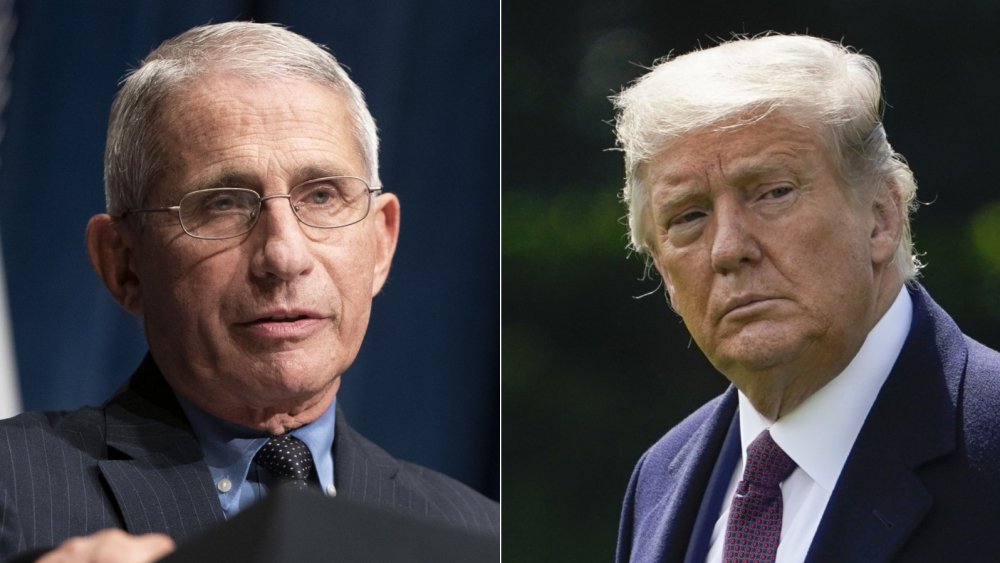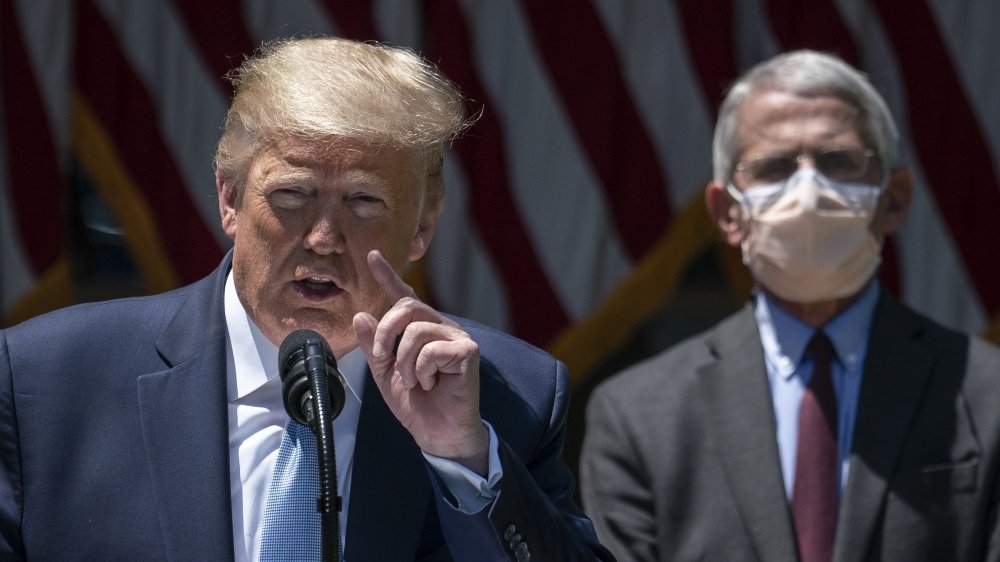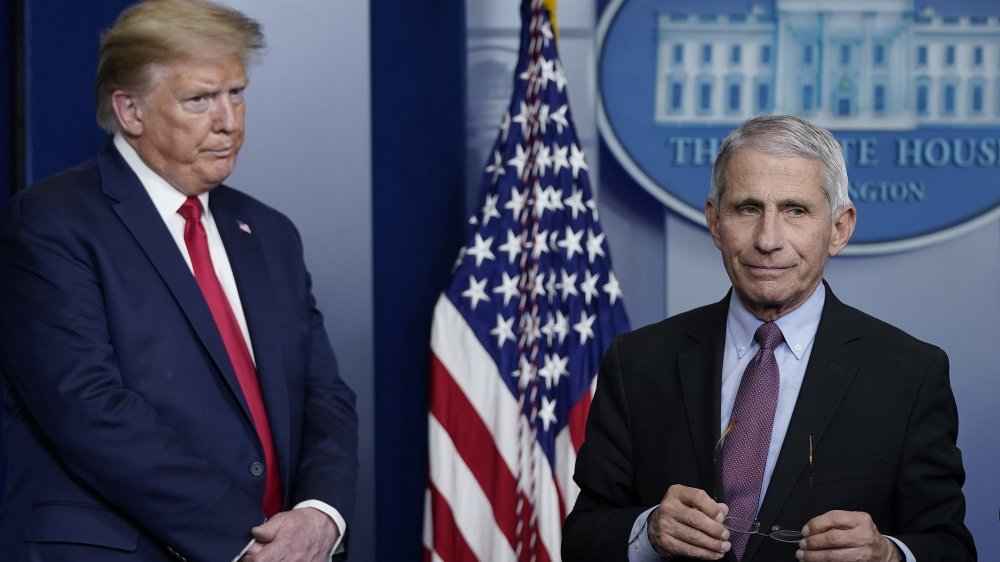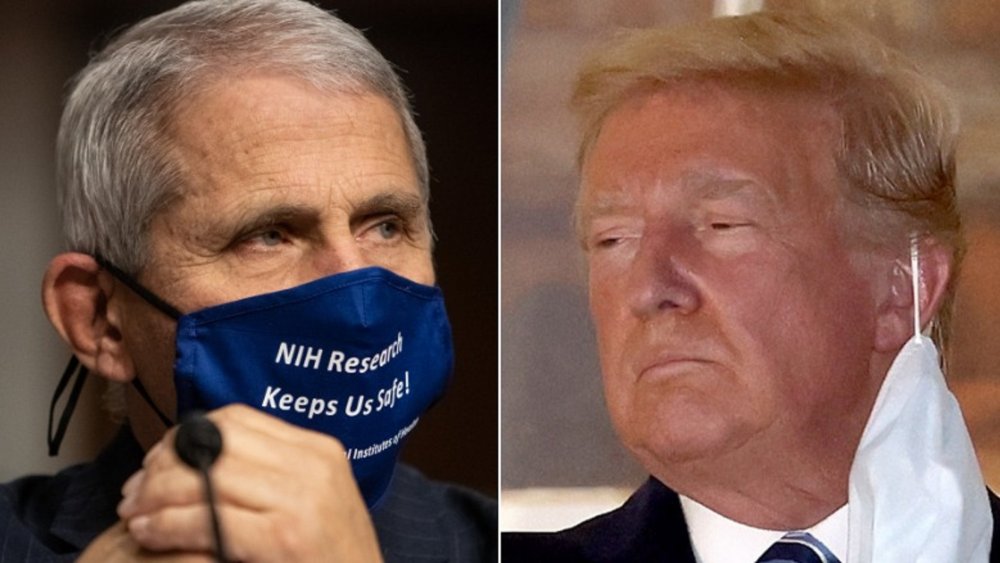Dr. Fauci Has A Dire Warning About Trump's COVID-19 Recovery
When President Donald Trump announced that he had tested positive for coronavirus on Oct. 2, 2020, it came as a surprise — as much of a surprise as anything in 2020 can come, anyway. That evening, Trump boarded a helicopter on the lawn of the White House to head to Walter Reed Medical Center to receive treatment for the virus. By the evening of Oct. 5, 2020, the president surprised everyone yet again when he returned to the White House, claiming to "feel better than [he] did 20 years ago."
However, not everyone was as quick to celebrate. The New York Times warned on Oct. 6, that President Trump could still be contagious, and that he is still fairly early in his prognosis, which could mean that it's a bit too premature to celebrate. Also sounding the alarm was Dr. Anthony Fauci, a figure who has frequently and publicly disagreed with Trump throughout the ongoing pandemic.
Dr. Fauci warns that Trump's recovery could reverse
Upon Donald Trump's release from the hospital on the evening of Oct. 5, 2020, Dr. Anthony Fauci stressed that while the president may look fine, it's too early to say definitively that he has beaten the coronavirus. "It's no secret that, if you look at the clinical course of people, sometimes when you're five to eight days in, you could have a reversal," Dr. Fauci told CNN. "A reversal meaning going in the wrong direction and getting into trouble."
Dr. Fauci, who serves as director of the National Institute of Allergy and Infectious Diseases, a non-partisan institute within the Department of Health and Human Services, warned that the president's medical team needs to proceed with caution. "It's unlikely that it will happen, but there needs to be a heads up for it."
President Trump was treated with remdesivir and with Regeneron's experimental monoclonal antibody treatment while at Walter Reed Medical Center — a course that Dr. Fauci declined to endorse or discount. "Whether or not it was that got him better, I'm strongly suspicious that it was," Dr. Fauci said. "But, obviously, you can't prove that until you do a number of studies."
While Fauci's dire assessment is serious, this episode is hardly the first time he and President Trump have clashed.
Trump claimed Dr. Fauci was wrong about the coronavirus
On July 31, 2020, Dr. Fauci testified before the House of Representatives that the reason for the United States' continued surge in cases has to do with the way the country handled shutdowns and reopenings. Compared to Europe, where economies were shut down roughly 95 percent, the United States only shuttered its economy about 50 percent. "There are some states which did very well, there are some states that did not," Dr. Fauci explained, via CBS News.
The following day, Donald Trump took to Twitter to disagree with Dr. Fauci. "Wrong!" the president tweeted, claiming the number of cases in the United States was simply the result of more testing and not a lack of governmental response compared to other nations. Trump added, "Most of our governors have worked hard & smart. We will come back STRONG!"
Dr. Fauci and Donald Trump continue to clash on COVID-19
Donald Trump's history of public clashes with Dr. Anthony Fauci goes all the way back to the beginning of March 2020, when COVID-19 started to become a daily concern for Americans. On March 12, Dr. Fauci refuted a claim by President Trump that testing for the virus would be easy and widely accessible. Comparing the United States to other countries and their mass testing capabilities, Dr. Fauci said (via CNN), "We're not set up for that... It is a failing, let's admit it." A week later, on March 19, Dr. Fauci pushed back against a claim from the president that malaria medication could be used to treat coronavirus, calling it "anecdotal evidence." Fauci said, "It was not done in a controlled critical trial, so you really can't make any definitive statement about it."
By the beginning of June, Dr. Fauci said the president was hardly speaking to him, much less heeding his advice. As states began relaxing precautionary measures in June, Dr. Fauci told CNN that he hadn't spoken to Trump in weeks, despite the number of cases and the death toll continuing to climb at the time. While President Trump is much more intimately aware of the danger associated with coronavirus than he was in June, it remains to be seen whether he will actually listen to Dr. Fauci's suggestion this time.




